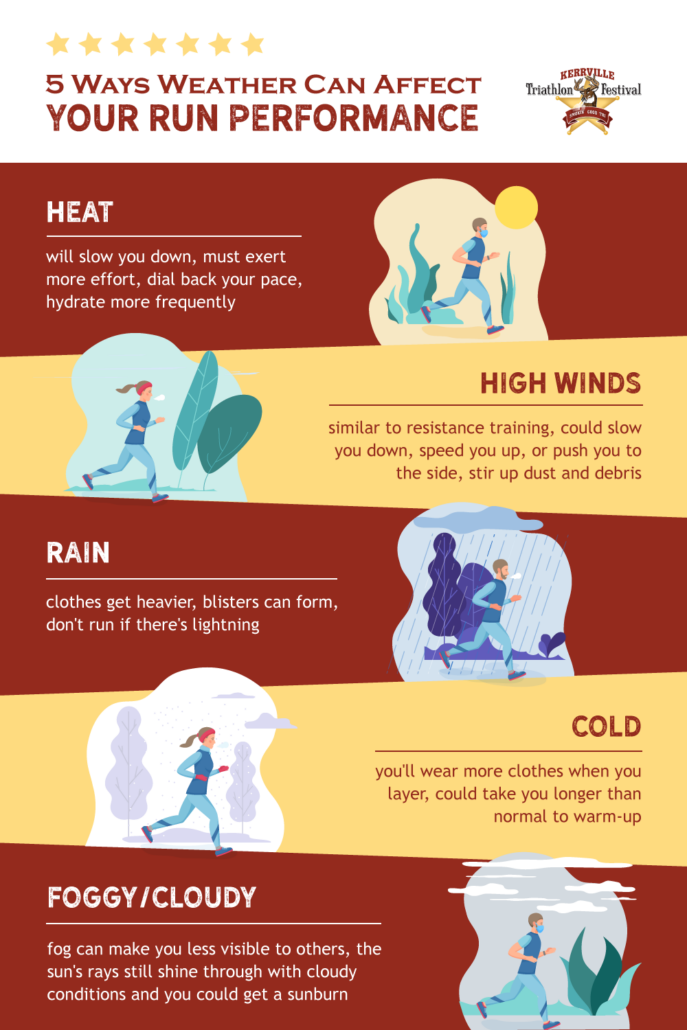5 Ways Weather Affects Run Performance
Weather affects run performance, especially if you’re not prepared
Triathletes deal with different weather year-round while running. Mother Nature can be a force if you’re caught off guard. Weather affects run performance, especially in extreme conditions. Make sure you know about the ways in which weather affects run performance so you can adjust accordingly. Understanding these circumstances is helpful during training, especially as you begin to increase your mileage. The information below will help prepare you for whatever Mother Nature has in store during your run.
Heat
 Running in hot weather slows you down considerably. You have to exert more effort and the heat raises your heart rate. Dehydration can be an issue because your body will sweat more in an effort to keep you cool. High humidity can add to the thickness of the air, making it seem like it’s harder to breathe. You can still run during the warmer months as it could benefit you during the cooler months. Make sure you increase your hydration, replenish the electrolytes you lose, and dial back your pace. Here are some different ways to can carry hydration on your run. If your schedule allows, run in the morning or the evening when it’s cooler.
Running in hot weather slows you down considerably. You have to exert more effort and the heat raises your heart rate. Dehydration can be an issue because your body will sweat more in an effort to keep you cool. High humidity can add to the thickness of the air, making it seem like it’s harder to breathe. You can still run during the warmer months as it could benefit you during the cooler months. Make sure you increase your hydration, replenish the electrolytes you lose, and dial back your pace. Here are some different ways to can carry hydration on your run. If your schedule allows, run in the morning or the evening when it’s cooler.
High winds
Everyone has been on a run where the wind goes against you no matter what direction you run. High winds can negatively affect your run performance and can act as a type of resistance training. They’ll slow you down, but just think that you’re getting stronger as a runner. High winds could also stir up dust and debris which could get in your eyes or impact your breathing, especially if you suffer from allergies. Check the air quality before you run and wear sunglasses to protect your eyes when you run.
Rain
For starters, your running pace suffers while running in rainy weather because you tend to run more cautiously. You may be apprehensive about slipping. Rain can soak your clothes, making them heavier. Soaked socks and shoes could lead to blisters. They’re a painful experience that nobody enjoys. If there’s lightning or a storm approaching with lightning do not start your run. If this happens mid-run, seek shelter immediately. If there’s a thunderstorm approaching, flip your run with a rest day and take advantage of the benefits.
Cold

Layer your clothes during a cold run so you can remove them and put them back on as needed.
As is the case with any kind of weather that affects run performance, it’s not just the outside temperature that matters. It’s more about how your body reacts to the weather that affects how you run. Your body generates heat when you run, so you shouldn’t feel too bad while running in the cold. The key is to properly layer so you can add and remove layers when necessary. You’ll more than likely encounter this weather because the training cycle is longer if you’re preparing for your first 70.3 distance. In colder temperatures, your body has to use more energy to keep vital organs warm. Blood vessels may constrict in the cold, reducing blood flow and the amount of fresh oxygen to your leg muscles.
Foggy/cloudy
Running in fog or when it’s cloudy can be risky. Visibility may be compromised in dense fog making it harder for you to see others or for others to see you. Run against traffic and wear reflective clothing. Don’t think you’ve got it made if it’s cloudy, the sun’s rays are still shining through. Apply sunscreen before a run and hydrate as you normally would. A false sense of security could lead to a nasty sunburn or thinking you don’t have to hydrate as much.









